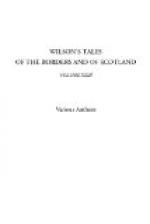“Where the roses blow and the oranges
grow,
And all is divine but man below.”
Fletcher Read might have recollected this, but what though? Was not the pun a good one—worthy of Hood? They all mounted the hearse, Panmure being driver; nor could Sandy Morren give to these white-robed spirits, who were so soon to rise in glory from the envious earth, more than a sour-milk horn and half a dozen of snow-white table-cloths for the theatrical property of the great players. So it has been since the time when the shepherd who killed the son of Aebolus, for that he gave them wine which they thought was poison, because they found their heads out of order—wine still generates on folly the afflatus of madness. The story goes on. The night was as dark as those places they were to illumine with their white robes, alas! not of innocence. But the darkness was not of the moon’s absence in another hemisphere; only that darkness which is cloud-born, and must cede in twinkling yet glorious intervening moments to the moon, when she will salute the graves and the marriage-guests; and the hearse, as it slowly wended its way up the road to Lochee, every now and then pouring forth from its dark inside peals of laughter. The travellers on the road look with wide eyes at the grim apparition, and flee. They arrive at the rough five-bar stile; it is thrown back, and the hearse is driven into the place of the dead. The story goes on. There is silence everywhere, and appropriately there, where the four brick corners of the smoke-coloured Cradle rise from the hollow of Balgay Hill. They waited till the moon shone out again in her calm, breathless repose; and then resounded from the clanging black boards of the hearse a terrible din resembling thunder, and already each man, with his table-cover rolled round him, was snug behind the solemn head-stones, storied with domestic loves severed by the dark angel.
Now was the time for the trumpet-call, which behoved to be sounded by the cycloborean lungs of the broad-chested Panmure. The story has no reason to flag where the stake of the grimelinage is the upraising of white-robed spirits. The sour-milk horn is sounded as it never was sounded before on the earth which had passed away; every spirit comes forth from below the head-stones; and there rose a wail of misery which nothing but wine could have produced.
“Mercy on our poor souls!”




